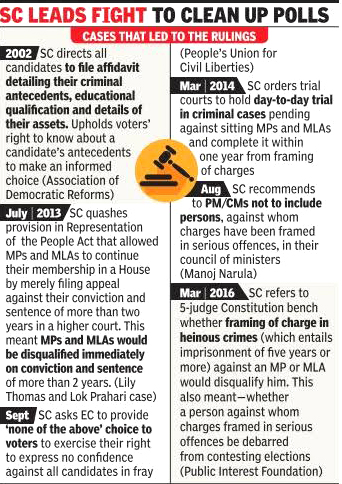Governance
Criminalization of Politics
- 07 Feb 2022
- 6 min read
For Prelims: Amicus Curiae, Representation of People's Act, Criminalization of Politics.
For Mains: Reasons, effects and solutions to Criminalization of Politics.
Why in News?
According to data compiled by the Amicus Curiae, a total of 4,984 criminal cases involving legislators were pending in various courts across the country as of 1st December, 2021.
- The Amicus Curiae was appointed by the Supreme Court for helping the court in setting up special courts to fast-track cases against MPs and MLAs.
- This trend highlights the increasing instance of criminalization of politics.
- An amicus curiae (literally, "friend of the court") is someone who is not a party to a case and may or may not have been solicited by a party and who assists a court by offering information, expertise, and bearing on issues of the case.
What is Criminalization of Politics?
- The criminalization of politics means the participation of criminals in politics which includes that criminals can contest in the elections and get elected as members of the Parliament and the State legislature.
- It takes place primarily due to the nexus between politicians and criminals.
What are the Legal Aspects of Disqualification of Criminal Candidates?
- In this regard, Indian Constitution does not specify as to what disqualifies a person from contesting elections for the Parliament, Legislative assembly or any other legislature.
- The Representation of Peoples Act 1951 mentions the criteria for disqualifying a person for contesting an election of the legislature.
- Section 8 of the act, i.e. disqualification on conviction for certain offences, according to which an individual punished with a jail term of more than two years cannot stand in an election for six years after the jail term has ended.
- The law does not bar individuals who have criminal cases pending against them from contesting elections therefore the disqualification of candidates with criminal cases depends on their conviction in these cases.
What are the Reasons for Criminalization of Politics?
- Lack of Enforcement: Several laws and court judgments have not helped much, due to the lack of enforcement of laws and judgments.
- Vested Interests: Publishing of the entire criminal history of candidates fielded by political parties may not be very effective, as a major chunk of voters tend to vote through a narrow prism of community interests like caste or religion.
- Use of Muscle and Money Power: Candidates with serious records seem to do well despite their public image, largely due to their ability to finance their own elections and bring substantive resources to their respective parties.
What are the Effects of Criminalization of Politics?
- Against the Principle of Free and Fair Election: It limits the choice of voters to elect a suitable candidate.
- It is against the ethos of free and fair election which is the bedrock of a democracy.
- Affecting Good Governance: The major problem is that the law-breakers become law-makers, this affects the efficacy of the democratic process in delivering good governance.
- These unhealthy tendencies in the democratic system reflect a poor image of the nature of India’s state institutions and the quality of its elected representatives.
- Affecting Integrity of Public Servants: It also leads to increased circulation of black money during and after elections, which in turn increases corruption in society and affects the working of public servants.
- Causes Social Disharmony: It introduces a culture of violence in society and sets a bad precedent for the youth to follow and reduces people's faith in democracy as a system of governance.
Way Forward
- State Funding of Elections: Various committees (Dinesh Goswami, Inderjeet Committee) on the electoral reforms have recommended state funding of elections which will curb use of black money to a large extent and thereby will have a significant impact on limiting criminalization of politics.
- Strengthening Election Commission: Regulating the affairs of a political party is essential for a cleaner electoral process. Therefore, it is imperative to strengthen the Election Commission of India.
- Vigilant Voters: Voters also need to be vigilant about misuse of money, gifts and other inducements during elections.
- Proactive Role of Judiciary: Given the reluctance by the political parties to curb criminalisation of politics and its growing detrimental effects on Indian democracy, Indian courts must now seriously consider banning people accused with serious criminal charges from contesting elections.





